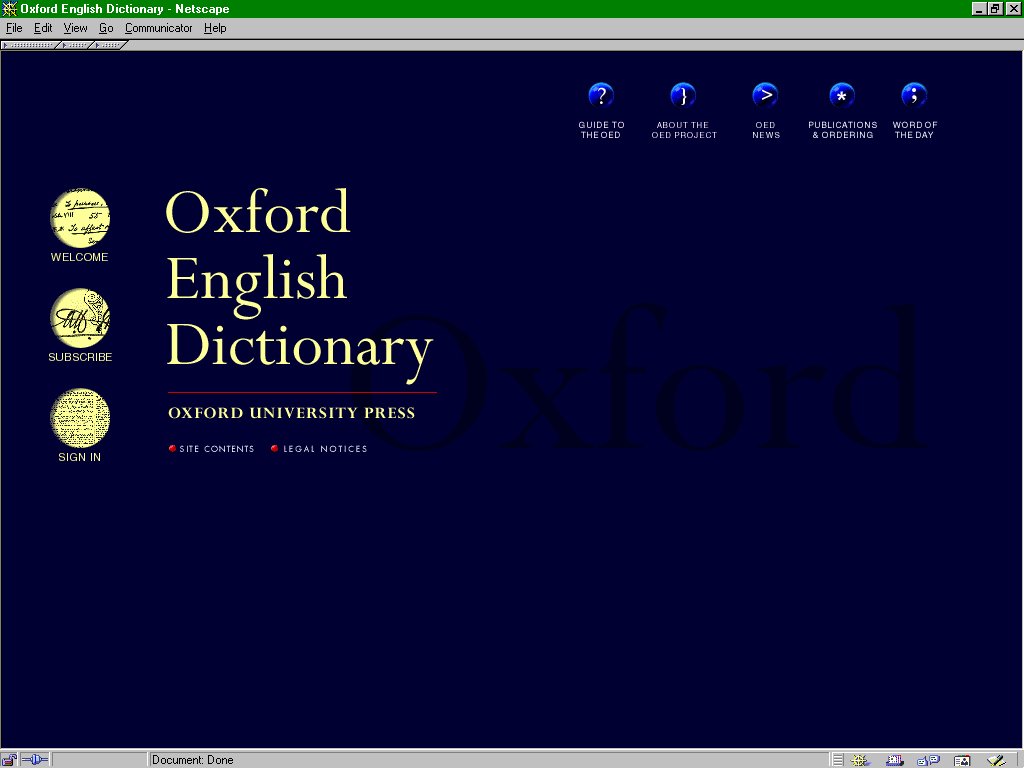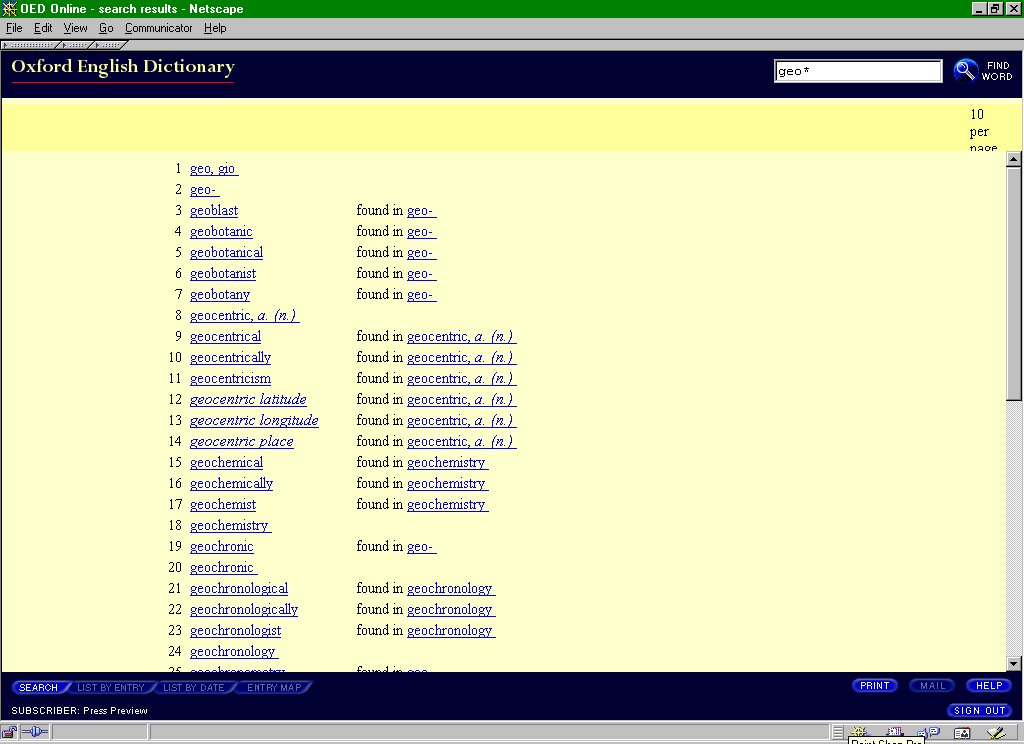Review: The Oxford English Dictionary Online
Cultural history, encyclopaedia, etymological record of the English language, spelling aid…
The Oxford English Dictionary is a number of things, and now it is a web site. What was once evocative of dusty tomes, thumbed by wizened professors of English in the recesses of University libraries is embracing the information age and going online.

But how can this, the most traditional of traditional works of literature, benefit from modern technology? An initial answer, in a word, is “revision”.
The Oxford English Dictionary, the record of the English language, took over forty years to complete the first time around; the first fascicle was published in 1884 and the last in 1928. Since then several supplements have expanded its coverage. In 1989, a second edition was published, consolidating all that had gone before but doing nothing so brave as to revise the text.
However, the English language, like the people who use it, is diverse and alive. It changes, evolves, borrows from other languages (perhaps even more so now in this global culture). Definitions change, and as historians reveal more about our past and scholarly thought matures, etymologies need to be revised. In the last one hundred years much of the content of the OED has become ready for revision or updating. In a time when national newspapers can cite new words and encourage their use each week, the Oxford University Press undertook to ensure the OED’s authoritative status and set about the much needed revision.
In the past an update of the text would have been a lengthy, if not impossible, task , and the result would be out of date by the time it was completed. However, as more and more of the text was moved into an electronic format (as part of the 1989 edition), and computer technology developed, it became clear that modern technology could facilitate the revision process in a much shorter time scale. Now, as the OED is launched into cyberspace, this revision is fully underway.
The revision process promises great things: new etymologies, taking into account modern thought and wider knowledge of diverse texts; revised or even new pronunciations; more and different examples of word usage, drawn from a various sources, many of which were unavailable to the original editors. Revisions include the modernisation of definitions, taking into account usage from around the English speaking world, and will be at the rate of 1000 per quarter. As sections of the text are completed, they will be incorporated into the online text and be accessible immediately, ensuring the most up-to-date dictionary of the English language available at all times. This is a fundamental benefit, utilizing modern technology to provide functionality, rather than gimmicks.
Further however, modern technology adds greater value to the traditional text, in a number of other ways. The display of the text has been updated and for the first time hyperlinks between related words are made available. This significantly reduces page flicking, but perhaps inhibits browsing and the discovery of words by accident. This is no minor complaint, because one of the joys of a dictionary is to browse through it and encounter some curiosity of the language. With an online edition that only displays a single word with its definition, or a list of undefined words, this enjoyment is limited. However, with a few very simple search methods (part of the electronic OED’s remit was to ensure a simple interface), including a full-text search, definitions, usage and all, the electronic OED can be put to good use.
There is the ability to display words in the chronological order of their introduction to the language. A word can be shown alongside its contemporaries, perhaps allowing the identification of periods of influence in the language. Words can be explored conceptually, making links across definitions (often revealing a few surprises that do allow for accidental discovery) with a simple search. Interesting searches arise when famous names are entered in the search box, revealing all the words that a particular person may have contributed to the language, or are associated with. Dates again make for interesting searches, allowing associations between words and events to be made.
A search on a similar word, or synonym, will often reveal the word you are looking for, and perhaps some alternatives that are better. This is an invaluable aid for writers everywhere, be it for a novel or a formal report.
 The electronic OED offers a search engine that can deal with wild cards, allowing searches such as “geo*” that would return a number of results that pertain to the earth and earth sciences (as well as several Kings!). In the documentation that accompanied my test access to the OED online there was list of other ways in which the dictionary can be used. I hope this list is included somewhere in the final version of the dictionary and one suggestion was in solving crosswords. A search like ?a?c?r may seem odd, but could provide that vital clue to the one word between you and the peace of mind a completed crossword can bring. This is perhaps even more useful if you create crosswords.
The electronic OED offers a search engine that can deal with wild cards, allowing searches such as “geo*” that would return a number of results that pertain to the earth and earth sciences (as well as several Kings!). In the documentation that accompanied my test access to the OED online there was list of other ways in which the dictionary can be used. I hope this list is included somewhere in the final version of the dictionary and one suggestion was in solving crosswords. A search like ?a?c?r may seem odd, but could provide that vital clue to the one word between you and the peace of mind a completed crossword can bring. This is perhaps even more useful if you create crosswords.
Further, for real word buffs, the OED’s wildcard searches can provide endless ways of spicing up Scrabble games - try searching for ?x or ?z for some interesting ways to dispose of awkward letters.
This electronic edition of the OED offers a number of advantages over the traditional text, but it is not without its faults. I have already mentioned the lessening of interesting discoveries by accident. Also, interestingly, the search engine is unable to deal with phonetically or incorrectly spelt words. Whereas my word processor’s spell checker can suggest “physics” from “fisics”, the electronic OED cannot. This is perhaps an unfair comparison, but it seems to me that an excellent enhancement of this dictionary would be some form of word suggestion.
The electronic OED could perhaps also benefit from the introduction of sound. While I am in no way suggesting the OED be developed into a multimedia dictionary, which might perhaps undermine its authority, one of the most awkward things about new words (especially for learners of a language) is their pronunciation. In the past paper based dictionaries have had to be content with a “Key to Pronunciation” populated with a number of confusing symbols. Here is a real opportunity to provide spoken guides to pronunciation. This seems a missed opportunity for an online dictionary that fully utilises technology to provide for its functional needs.
Finally there is a question of access. The OED is not a commercial venture, it has never made a profit for the OUP, yet it is being released as a subscription only service. This is clearly to offset the costs of the monumental task of maintaining the dictionary, but it is a shame. Here is an opportunity to bring the OED into the offices and homes of many people, making it the everyday tool that in its present paper form it cannot be. Indeed many of the proposed uses of the OED online are suited more to these environments, than the academic uses of the past. (I would gladly bookmark it and keep it on hand as another online reference guide). Yet it is unlikely that the average home user will subscribe. This is not a fault in the dictionary, nor with the OUP, but simply a lamentable fact.
To conclude then, the OED online is taking one of the greatest works of the English language, a collected record of our past, into the modern world. It offers a number of tools that make it easy to use, yet it is exceptionally powerful at finding that elusive word, its history and some of those who used it. Its only real fault it that some of the charm of several large volumes is lost. However it is a dictionary for the future that will remain a consistent record of the language for years to come.
Author Details
| Peter Cliff Systems Developer UKOLN University of Bath Email: p.d.cliff@ukoln.ac.uk |
